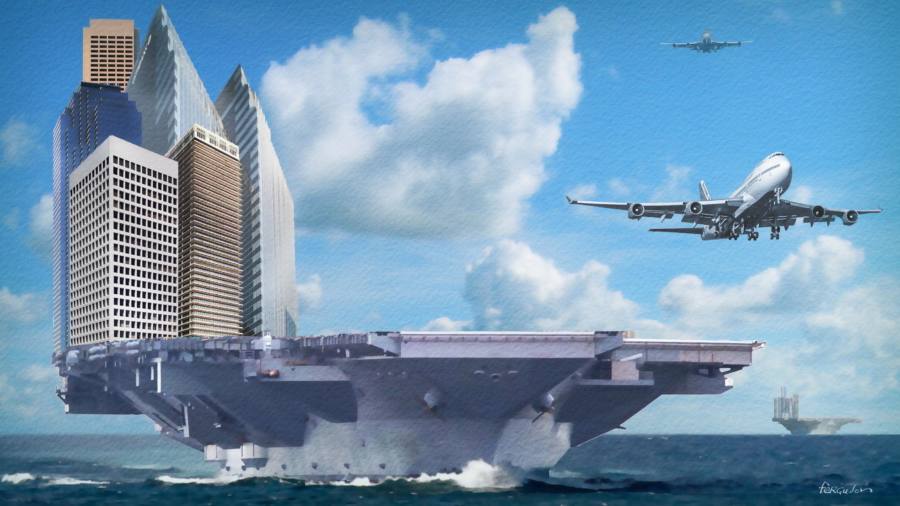Receive free Global trade updates
We’ll send you a myFT Daily Digest email rounding up the latest Global trade news every morning.
One of the oldest and most persistent ideas of the western enlightenment is the civilising force of free economic exchange. The belief that trade and political concord reinforce one another — at times called doux commerce or “gentle commerce” — goes back at least as far as Montesquieu’s writings 300 years ago.
This belief motivated some of the weightiest economic decisions of the past 50 years: Washington’s welcome of China into the World Trade Organization; Germany’s determination to tie itself to Russia in a relationship of energy-based interdependence; and the EU’s confidence that its granting of membership could turn poor, unstable neighbours at risk of authoritarianism into bulwarks of liberal democracy.
In each case, an overarching confidence in the link between economic growth and political liberalism joined more selfish motives to tip the scales in favour of deeper economic ties.
Granting China permanent market access while tying it into the global architecture of trading rules would, many thought, strengthen its reformers. Germany’s pipeline policy paired industrialists’ interest in cheap gas with the nobler justification of Wandel durch Handel, or “change through trade”: that Russia’s elites would conclude from economic rewards of ties with the west that they should emulate its example. The EU accession process demonstrated its power to drive liberalising reforms many times over since the 1980s.
But in the past 20 years, the modern incarnation of the doux commerce thesis has taken some significant knocks. Far from “westernising” poorer, less democratic countries, today’s consensus is that economic integration undermined liberal democracy in the west while giving autocracies the added appeal of economic strength.
The charge sheet looks damning enough. The “China shock” is blamed for hollowing out manufacturing and creating demoralised “left-behind” regions in the US and beyond. Since Xi Jinping rose to the top in Beijing, he has increased repression inside China and aggression outside, burying hopes for political liberalisation or support for the rules-based global order.
Moscow’s brutal assault on Ukraine has put paid to Wandel durch Handel — and should have done so when Putin’s Russia first attempted to dismember Ukraine in 2014. The spell of EU integration has been broken, with not just prospective but current members, from Turkey to Hungary, turning their backs on pluralist liberalism. And through it all, the global financial crisis and its political aftermath undermined western countries’ credibility as examples of the notion that prosperity and liberal democratic governance go hand in hand.
But look closer and the story these events tell is more complex, and more flattering for the old view of liberalism and prosperity’s codependence.
Start with China. Expectations of a strong rebound once Beijing abandoned its repressive version of “zero Covid” have given way to economic pessimism. Waning growth prospects look increasingly like a consequence of Xi’s shift from a developmental to a security state.
As Adam Posen highlights in an important new essay, the extreme arbitrariness of Beijing’s Covid policy “reinforced the sense among Chinese people that their jobs, businesses, and everyday routines remain at the mercy of the party”. Arbitrary political interventions kill the willingness to spend and invest in illiquid assets, as “risk aversion and greater precautionary savings act as a drag on growth, rather like what happens in the aftermath of a financial crisis”.
Rather than disproving the old liberal belief, China increasingly looks like it was at most a temporary exception that confirms the rule.
We also cannot dismiss the EU’s power to drive liberal reforms. In some cases it remains strong, most evidently in Ukraine where it has fuelled economic and governance reforms for a decade. In Hungary and Poland, the very fact of EU membership has restrained their authoritarian slide: just imagine what Viktor Orbán or Jarosław Kaczyński could have wrought had their countries been outside the bloc. As for Turkey, its liberalising era ended when it became clear EU membership was not in fact on offer, due to opposition from members such as France.
Far from refuting claims of a link between liberal economic exchange and political liberalisation, these cases rather show that, over time, liberalism and prosperity decline (or hold up) together.
If anything disproves the thesis, it would seem to be Russia — and other petrostates like Saudi Arabia. But recognise these for the special cases they are: not diverse webs of deepening economic exchange so much as monopolised supplies of essential inputs. The west’s mistake was not to believe in the power of doux commerce, but in seeing these ties as bona fide commerce rather than geostrategic shakedowns.
Consider, too, how liberal democracies substituted for Russian energy in record time. In a vindication for the liberalism-prosperity link, their political system helped address economic emergencies when it mattered most.
Besides, Russia has only begun to be tested by its far-from-complete economic isolation. To achieve the hoped-for political effects, it must be cut off more thoroughly and for longer. The west would do well to rediscover the patience and courage of its convictions.
Read the full article here




